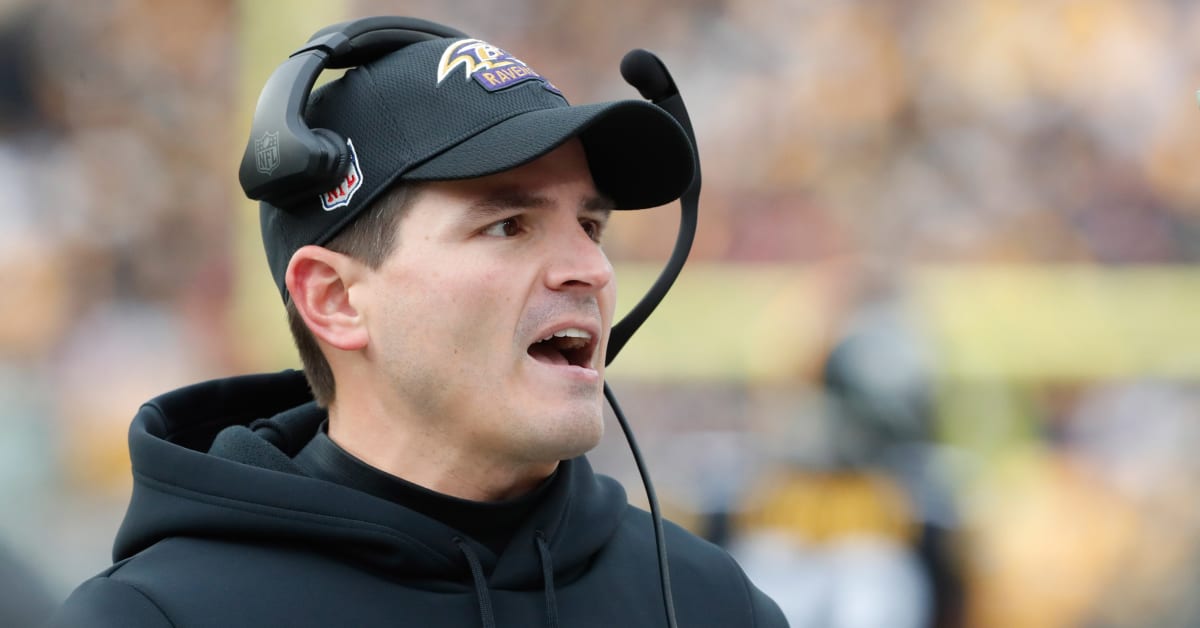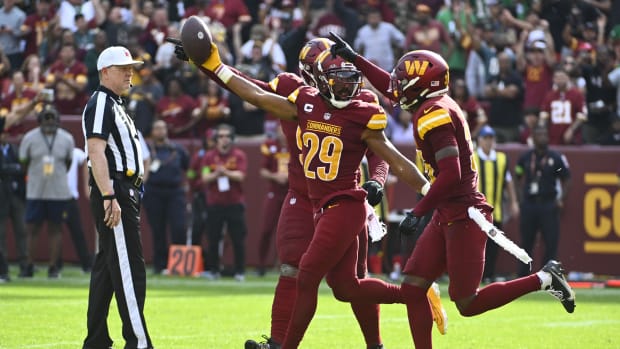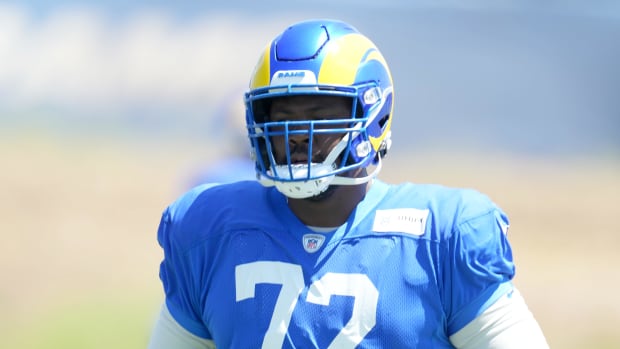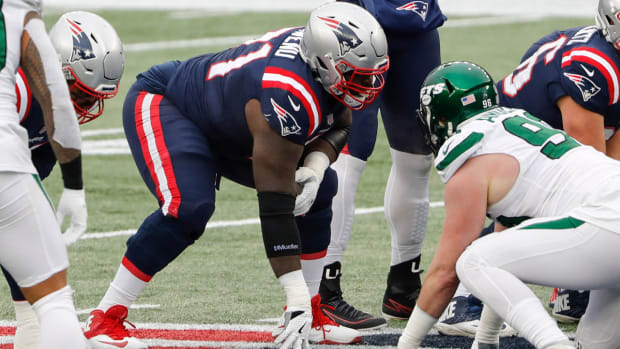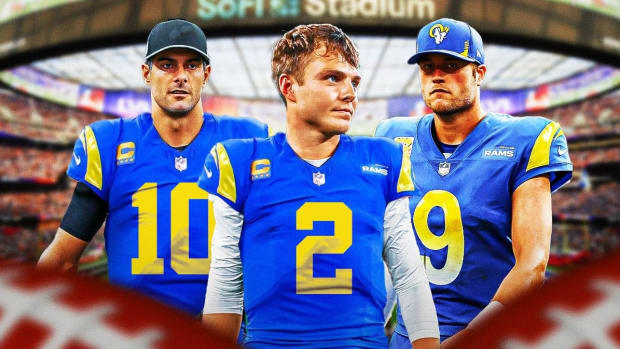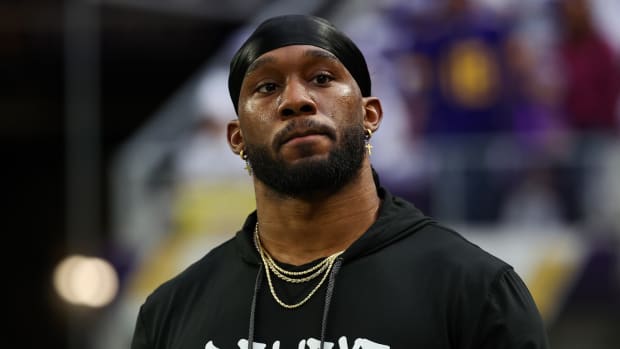Why the Seahawks Hired Mike Macdonald, a Coach Too Smart to Fail
In replacing Pete Carroll, the bouncy, ever-optimistic septuagenarian who made a football brand out of eliminating negativity, the Seattle Seahawks chose to stay on the defensive side of the ball.
From the outside looking in, hiring Mike Macdonald, the 36-year-old second-year defensive coordinator without a collegiate playing career and a long stretch of time under the umbrella of one successful organization, may seem like a risk. But to those who understand both the dynamics of Baltimore’s inner-workings and the pressures that come with rising through the Ravens’ defensive staff, Macdonald is not only a sensible replacement for Carroll, but also a fairly logical choice.

Macdonald spent the 2021 season with Michigan before rejoining the Ravens.
Charles LeClaire/USA TODAY Sports
Throughout the coaching search process, there were two refrains attached to Seattle in particular: We shouldn’t be quick to assume that Dan Quinn was returning home, and the Seahawks need some way to combat a long-term residency alongside Kyle Shanahan and Sean McVay. In that way, the Seahawks don’t necessarily need a coach who is going to come in and maintain a brand. They need a coach who is going to keep pace schematically, and be able to withstand the pressures that come with battling in an intellectually challenging environment. Quinn’s chops as a defensive gameplanner are well established, but Macdonald had an incredible run against the league’s best play callers and quarterbacks this year.
Take a look at this résumé:
• Less than 20 points allowed against the San Francisco 49ers
• 10 and nine points, respectively, allowed against the Houston Texans
• Six points allowed against the Detroit Lions
• Less than 20 points allowed against the Miami Dolphins
• All the while, Macondald blitzed less—yes, I said less—than all but seven teams in the NFL, mostly Carroll and Fangio devotees. However, Baltimore finished the season leading the league in sacks. The Ravens had three more sacks than Kansas City, but sacrificed players in coverage 11% fewer of the time. This is objectively wild.
And then we have an early November beatdown (37–3) of Seattle in Baltimore, where the Seahawks found themselves in perpetual offensive checkmate. The first-down runs were siphoned into the gaping middle of a strong defense and swallowed up. There was rarely any display of intent from the defense, and then, by the time Seattle knew it, third down was coming and so was Baltimore’s unique pressure package. Geno Smith finished that game with a quarterback rating under 50. There is no doubt this game left an impression on the team that would eventually hire Macdonald.
To learn more about Macdonald, I spoke with Leslie Frazier a few months back, who was in Baltimore’s defensive meeting room when Macdonald was coming up. Frazier made two points that I found particularly relevant based on what Seattle was looking for:
• Macdonald’s job as a grunt was to find and develop third-down pressures. That meant taking inspiration for great blitzes from everywhere and applying them situationally. Frazier said he learned, during those moments and through that process, how well Macdonald understood offenses. The coordinator didn’t just uncover good pressures, he was able to apply them strategically based on what he was pretty sure the offense was going to do.
• The Ravens’ defensive coordinator job is not a head coaching job, but it’s not unlike one, either. The aura of the Ravens defense comes with certain expectations, and Macdonald had the unenviable task of following some massive personalities: Rex Ryan, Chuck Pagano, Dean Pees and Wink Martindale. In that room existed some serious gravitas. A coach is not going to last unless he is immensely comfortable in his own skin, and he can offer the players something new. Again, it’s not the exact same process as taking over a head coaching job, but it’s a similar one.
Macdonald took command of a Baltimore defense that had stars as young as 22, plus veteran role players such as Kyle Van Noy, 32, and Jadeveon Clowney (who is somehow only 30 but feels like he’s been playing football for a quarter century). Van Noy played for Bill Belichick, and yet the linebacker had his best season in years under Macdonald in 2023. Clowney, too, has not been that complete a weapon defensively since he was in a unit alongside J.J. Watt.
Seattle is gambling now on Macdonald being able to offer something new to their set of talented cornerbacks and young edge players, while also continuing to frustrate Shanahan and McVay. Some who know Macdonald wondered if he could handle galvanizing an entire locker room, but others have said it’s his personal, disarming nature that will win people over on an individual level.
Again, different from Carroll. Different from what Seattle has known for 13 years—a lifetime in the NFL coaching business. But, perhaps, necessary. If Seattle was going to deviate from its established milieu, it was only going to do so hedging its bets on someone too smart to fail.
































